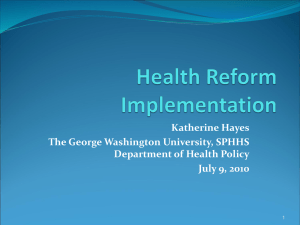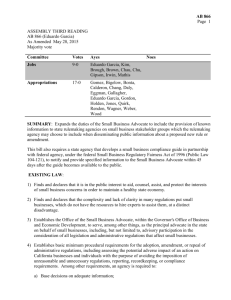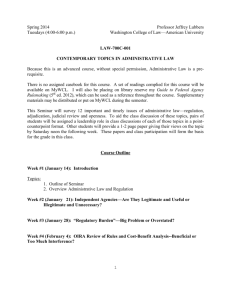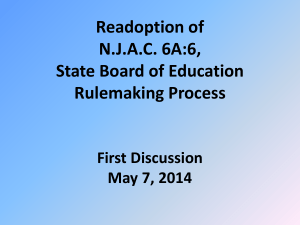The Role of Economic Analysis in
advertisement
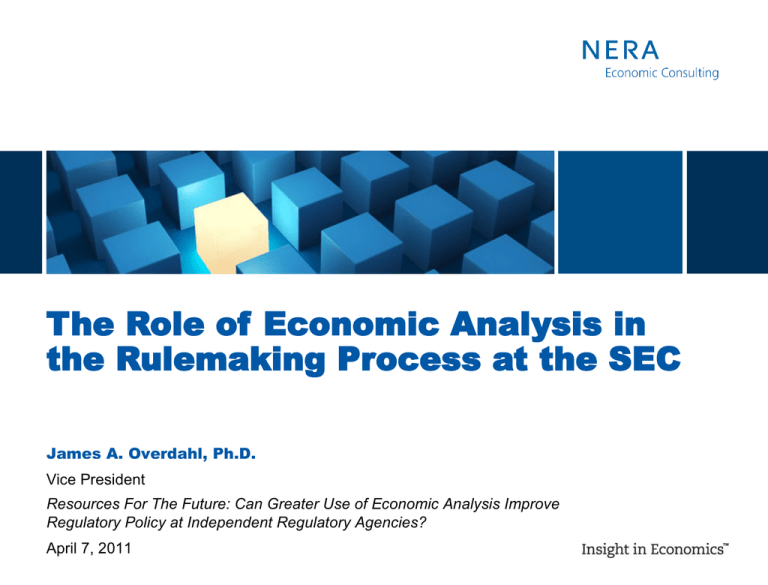
The Role of Economic Analysis in the Rulemaking Process at the SEC James A. Overdahl, Ph.D. Vice President Resources For The Future: Can Greater Use of Economic Analysis Improve Regulatory Policy at Independent Regulatory Agencies? April 7, 2011 The Role of Economic Analysis in the Rulemaking Process at the SEC How economic analysis affects the rulemaking process Current role of economic analysis at the SEC in the rulemaking process Obstacles limiting effective application of economic analysis to the rulemaking process Suggestions on how the process can be improved Case study: Reg SHO amendments restricting short selling (February, 2010) Source: Compiled from index providers (2006) 2 How Economic Analysis Affects the Rulemaking Process Disagreement among regulators about what “cost benefit analysis” or “regulatory impact analysis” should include. – More than what is readily quantifiable – Includes qualitative factors – Identifies tradeoffs and potential effects (including “unintended consequences” of an action) – Identifies potential changes in behavior of market participants Enhances the ability of commissioners to ask better questions and make more informed decisions Enhances the transparency and accountability of the rulemaking process Source: Compiled from index providers (2006) 3 Current Role of Economic Analysis at the SEC There are no formal requirements to include economic analysis at the SEC aside from the cost-benefit requirements of the Paperwork Reduction Act (PRA) Not consistently applied across the rulemaking agenda or across time at the SEC Statutory duty to “consider” whether a regulatory action “will promote efficiency, competition and capital formation” Administrative Procedure Act (ACT) requires federal regulatory agencies to adequately justify the exercise of their rulemaking authority (not “arbitrary, capricious, an abuse of discretion, or otherwise not in accordance with the law”) Source: Compiled from index providers (2006) 4 Recent Court Challenges to S.E.C. Rules Chamber of Commerce of U.S. v. S.E.C., 412 F.3d 133 (D.C. Cir. 2005), and 443 F.3d 890 (D.C. Cir. 2006) Am. Equity Investment Life Ins. Co. v. S.E.C., 572 F.3d 923 (D.C. Cir. 2009), and 2010 WL 2813600 (D.C. Cir. July 12, 2010) NetCoalition v. S.E.C., 2010 WL 3063632 (D.C. Cir. August 6, 2010) U.S. Chamber of Commerce and Business Roundtable petition for review of proxy access rules (Sept. 29, 2010) 5 Bottom Line from Court Decisions Court challenges to SEC rules have turned on the adequacy of the economic support considered by the SEC when it adopted new rules The SEC’s economic arguments need to be adequately supported—vigorous assertion is not a substitute for rigorous economic analysis 6 Impact of Court Decisions Parties submitting comments are paying particular attention to the quality of their economic arguments and supporting empirical evidence to help inform regulators but also to lay the groundwork for possible court challenges 7 Obstacles to Economic Analysis in the Rulemaking Process Lack of consistent requirements – Although there have been attempts to formalize requirements at the SEC, these attempts have not been institutionalized Being overtaken by events – E.g., The Financial Crisis of 2008 Lack of “buy-in” by rulemaking divisions – Turf battles – Viewing economic analysis as “all cost and no benefit” “sand in the gears” “slow walking” “interfering with worthy initiatives” “boxing in” commissioners “you’ll make us look like idiots” 8 Obstacles to Economic Analysis in the Rulemaking Process Lack of relevant data – PRA limitations on surveys – Treatment of confidential data (FOIA, public comment process). Small economics staff Reliance on public comment process to supply data and analysis – Can never be a substitute for the Commission conducting its own analysis – Quality of data and analysis through the public comment process has improved as affected parties regard the process as a legal proceeding. Comments are directed not only at the Commission but to judges who may be reviewing the record 9 Suggestions for improving Economic Analysis in the Rulemaking Process Some type of formal requirement is necessary to institutionalize economic analysis at the SEC. Good intentions are not sufficient to sustain a consistent role for economic analysis Economic analysis needs to be included at an early stage in the process to review both the proposed rule and the problem the rule is aimed at addressing – “Term sheet” review – Early review would allow economics team to assess the complexity of the analysis required and begin gathering data that can be applied to analyzing the proposed rule The process of collecting data must be improved – Streamline process to conduct surveys – Develop process for handling confidential data – Use pilot programs to generate data when appropriate – Encourage better use of the public comment process 10 Suggestions for improving Economic Analysis in the Rulemaking Process Development of a guide for the use of economic analysis in the rulemaking procedures of financial regulators like the SEC. The FSA guide would be a good starting point Economic analysis needs to be a higher priority at the SEC 11 Case Study: SEC’s 2010 “Alternative Uptick Rule” for Short Sales Amendments to Regulation SHO included a restriction (“Alternative Uptick Rule”) aimed at constraining short sales during times of market stress. The premise of the rule was that short sales contributed to unwarranted stock price declines that undermined investor confidence The economic evidence failed to support the rule’s premise The Commission voted 3-2 to adopt the new rule on February 24, 2010 12 What is Short Selling? In a short sale, the seller borrows stock from a shareholder willing to lend their shares. The short seller then sells the borrowed shares in the market, establishing a “short position.” At some point, the short seller repurchases shares from the market and returns them to the lender A short seller believes that share prices are overvalued and will fall. If his view is correct, he will sell his borrowed shares at a high price, and repurchase them at a lower price 13 Case Study: SEC’s 2010 “Alternative Uptick Rule” for Short Sales Economic analysis could say very little about “investor confidence.” However, there was abundant evidence about the effects of short selling and the effects of restricting short selling The SEC’s longstanding view had been that short selling helps investors by playing a useful role in price discovery, risk management, and lowering the overall cost of trading and raising capital 14 What Does the Evidence Say About the Effects of Short Sales Restrictions on Market Quality and Pricing? “Short Sale Constraints and Stock Returns” —Owen A. Lamont and Charles M. Jones, The Journal of Financial Economics, Vol. 72, No. 2, November, 2002 “Limited Arbitrage and Short Sales Restrictions: Evidence from the Options Markets” —Eli Ofek, Matthew Richardson, and Robert Whitelaw, The Journal of Financial Economics, Vol. 74, No. 2, November, 2004, pp. 305-342 “Failure is an Option: Impediments to Short Selling and Option Prices” —Richard B. Evans, Christopher C. Geczy, David K. Musto, and Adam V. Reed, Review of Financial Studies, Vol. 2, No. 5, May, 2009, pp., 1955-1980 15 What Does the Evidence Say About the Effects of Short Sales Restrictions on Market Quality and Pricing? “Economic Analysis of the Short Sale Price Restrictions Under the Regulation SHO Pilot,” — Office of Economic Analysis, United States Securities and Exchange Commission, February 6, 2007 16 What Does the Evidence Say About Short Selling and Returns? “Short-Sale Strategies and Return Predictability” —Karl B. Diether, Kuan-Hui Lee, and Ingrid Werner, The Review of Financial Studies 22 (2), 2009, 575-607 “Analysis of Short Selling Activity during the First Weeks of September 2008” —Daniel Aromi and Cecilia Caglio, SEC Office of Economic Analysis, December, 2008 17 What Does the Evidence Say About Short Selling and Risk Management and Capital Formation? Convertible bonds are an important source of financing for many companies. Buyers of convertible bonds depend on the ability to sell stock short to hedge the stock component of the bonds. If they are unable to sell shares short, they are less willing to buy convertible bonds and the cost to corporations of this important source of financing would increase See Daniel Choi, Mila Getmansky, Brian Henderson, and Heather Tookes, “Convertible Bond Arbitrageurs as Suppliers of Capital,” Review of Financial Studies, Vol. 24, No. 3, March, 2011 18 Bottom Line on Evidence Short selling more intense in rising markets, not falling markets Short sales less aggressive than long sales Intensity of short sales tied to extreme negative returns for illiquid, low-cap stocks Restrictions on short selling degrade market quality and price discovery, and hinder risk management 19 Commissioner Paredes’ Dissent “Because of its indeterminacy, investor confidence, when relied upon as the predominant regulatory justification as it is in this rulemaking, affords the Commission too much discretion to regulate, unchecked by the discipline of more exacting and rigorous analysis. More is needed to justify regulating our securities markets than the unfalsifiable assertion that the alternative uptick rule will shore up investor confidence, particularly given the empirical data, including studies that this agency’s Office of Economic Analysis has conducted, that counsel against imposing a short sale price test.” (February, 24, 2010) 20 Conclusion Economic analysis is more than about satisfying procedural requirements for regulatory rulemaking. Improving the power and consistency of economic analysis at independent regulatory agencies, like the SEC, is important because it will enhance the ability of regulators to make informed decisions. An added benefit is that it will also help enhance the overall transparency and accountability of the rulemaking process 21 22 Contact Us James A. Overdahl, Ph.D. Vice President NERA—Washington, DC +1 202 466 9256 james.overdahl@nera.com © Copyright 2010 National Economic Research Associates, Inc. All rights reserved.

